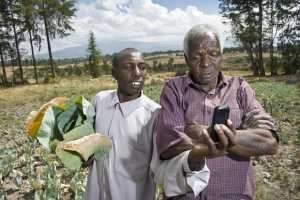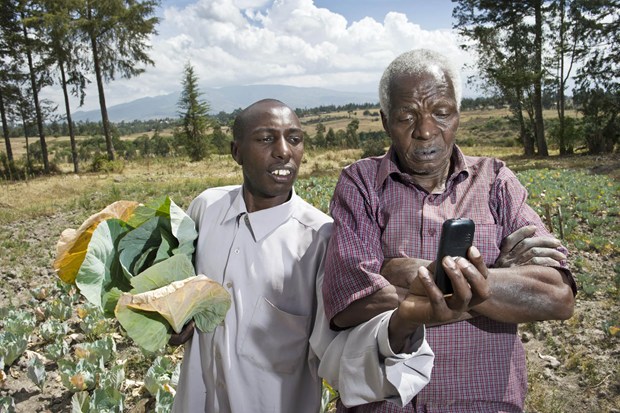In 2006, Mark Davis started Esoko in Ghana after an unsettling observation. Farmers in rural Ghana, and much of Africa, were getting the worst possible prices for their products at the local markets. This was due to lack of information on where farmers could sell their produce at a better price.
To bridge this information gap, Davies created a mobile-based platform that sent SMS notifications to farmers. The solution couldn’t have come at a better time as the mobile sector was growing rapidly in the continent. Eight years later, Esoko is in 10 African countries including Kenya and has sent over 9.5 million SMS texts to farmers.
Driven by a mission to transform small-holder farmers’ lives, Esoko has since then added other services and products on top of the SMS-to-farmersPaolo Mele, Kenya Country Manager, explains the social enterprise model Esoko has adopted ensures the technology company keeps afloat as well as serving farmers at an affordable cost.
“Since we set up in Kenya in 2013, we have spent time learning what is different about Kenya, the Kenyan farmers and the sophistication of the mobile ecosystem. We are now working with a number of different NGO’s and organizations with the aim of increasing quality in different value chains,” says Mele.
In addition to linking farmers to the best priced markets – which also happens to be the most requested information from farmers – Esoko has branched into sending weather alerts, conducting baseline polls in partnership with NGOs, and licensing Esoko’s software to agribusinesses and organizations interacting with small-scale farmers.
“We have a web application that gives a breakdown of number of farmers in a particular area, what they are farming and their output. Android application is used by organizations that have field officers or extension officers they can collect information from the field and share on the platform so that it is easier to know who has what at a particular time,” adds Mele.
The diversification of products has enabled Esoko to boost their income by 11 percent in 2014/15 financial year, which partly supports a 57-strong team primarily based in Ghana and Kenya. Esoko has managed to secure investment from Acumen, International Network Investment and Lundin Foundation in a mixed equity-debt arrangement.
“A big chunk of our bread and butter have been working with NGOs and organizations that are using our tools to interact with farmers. This has its challenges and benefits: While we can provide this service at a minimum to free to farmers, the service is limited to the project life cycle of NGO programs, leaving farmers vulnerable after the end of the project,” says Mele.


A new revenue model that was first adopted in the Ghana office, and now in Kenya, is the National Farmers Club where farmers are voluntarily signing up to receive SMS information for Sh20 per week. Subscribers receive information about the weather, best farming practice, market prices ask questions to on-call agronomist. In Ghana, Vodafone has partnered with Esoko to disseminate critical information to its customers in rural farming regions.
These partnerships and initiatives have led to the growth of incomes and yields for thousands of farmers across Africa. In Machakos, where Esoko has conducted a pilot study among 802 farmers, there was a 5 – 10 percent increase in the prices farmers got for their produce compared to the previous season. A more comprehensive and controlled study is being done in Ghana in partnership with New York University as well as a study in Kenya on the impact of financial information delivered to farmers through the Esoko platform. A number of farmers are changing their agricultural activities because of the information we are sending. We have done some robust scientific work is in Kitale and Eldoret where the increase in income has been between 12-15 percent, which is a significant growth,” explains Mele.
According to Mele, Kenya’s mobile penetration, however, presents a unique position for Esoko. While this means many people can be reached through the service, there are also a number of SMS services offered in the market that may have tainted this model.
“Some farmers are wary because some of those services are hard to unsubscribe. We are exploring different payment options like subscribing for the service on a nee-to-use basis and paying via mobile money service,” adds Mele.
“Esoko’s unique proposition is that we can offer different products to different clients; farmers and organizations working in the agricultural sector and this is what we want to continue offering, in a better, affordable way.”








